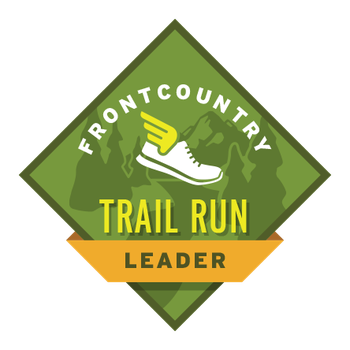Badge
Frontcountry Trail Run Leader
DESCRIPTION OF SKILLS
The holder of this badge has demonstrated sound judgement, strong leadership skills, and technical proficiency in:
- Travel over a variety of trailed frontcountry terrain, including slippery, rocky, or otherwise diverse trail running terrain
- Group leadership, including trip planning and group dynamics
- Route planning; use of topographical maps, GPS, or other navigational tools in planning and executing a trail run
- General mountain safety, including identification of hazards such as: exposure, technical terrain, changing weather, etc… and actions to minimize risk
- Basic First Aid
- Emergency preparedness (including emergency bivouacs and how to summon help, should it be needed)
- Self-supported group trail running fundamentals
WHAT DOES THIS BADGE ALLOW ME TO DO?
This badge allows owner to plan, organize, and lead trail runs in frontcountry terrain as designated in the Mountaineers’ Trail Running Minimum Standards.
HOW DO I GET THIS BADGE?
To become a frontcountry trail run leader, club members must:
- Submit an application to the Trail Running Committee
- Have completed three (3) or more group frontcountry trail runs, either with the Mountaineers club or privately
- Schedule and successfully lead one (1) mentored frontcountry trail run with an existing trail run leader, as arranged by the Trail Running Committee
- Mentor reports to Trail Running Committee that candidate meets requirements and expectations and is qualified to become a frontcountry trail run leader
- Frontcountry trail run leader candidates are welcome to request more than one mentored run
Committees are responsible to verify that prospective leaders are competent in the key elements listed above using a structured, objective method. The following are examples of avenues that could be used:
- Data from application form and/or activity/course history
- Other leader badges (e.g. Climb or kayak leader or other)
- Documented completion of classes (Red Cross First Aid, Wilderness First Aid, “Staying Found” or Wilderness Navigation or equivalent external class)
- Trail running leader seminar or equivalent
- Take-home test following leader seminar or as a “equivalency” in lieu of seminar
- Structured interview with committee chair/experienced committee member or designate to validate knowledge
- Mentored trail run in which the mentor evaluates against the standards to the degree possible
Committees have flexibility to use different combinations of the above methods appropriate to individual leader candidates, maintaining flexibility to recognize experience and training from another activity or from outside the club where it directly applies to the key leader competency requirements. However, the committee must maintain a mechanism to document their evaluation of a leader candidate against the key criteria so that any outside party can understand the objective method used to qualify the person.
It is strongly recommended that each trail run leader attend a trail run leader seminar including an overview of the minimum standard and all the key leader criteria and expectations, even if they have led other activities for the Mountaineers. Other outdoor leadership seminars offered by the Mountaineers can also suffice, or extensive documented experience as an outdoor leader, in the judgment of the Trail Running Committee.
In addition, because frontcountry trail runs have no prerequisites, frontcountry trail run leaders often have to face much greater challenges in screening participants, ensuring basic preparedness, providing first aid and navigation expertise for the group, determining the appropriate required gear, and managing safety and pace during the activity than leaders of backcountry trail runs or other activities that have significant prerequisites for participation. It is expected that frontcountry trail run leaders will communicate to participants what is appropriate and required for each trip on a trip-by-trip basis. In addition, though the ten essentials are not required for participants on beginner or moderate frontcountry runs, it is expected that the leader of these runs will carry the majority of the ten essentials or have them located nearby and convey what is required for participants to carry on their specific run. For example: the trip leader carries at small, light first aid kit, and also has a more comprehensive kit located in a car at the trailhead.
Leaders are expected to lead trail running trips within their ability.
Contact the relevant committee contact through your branch’s roster for application information and requirements.
